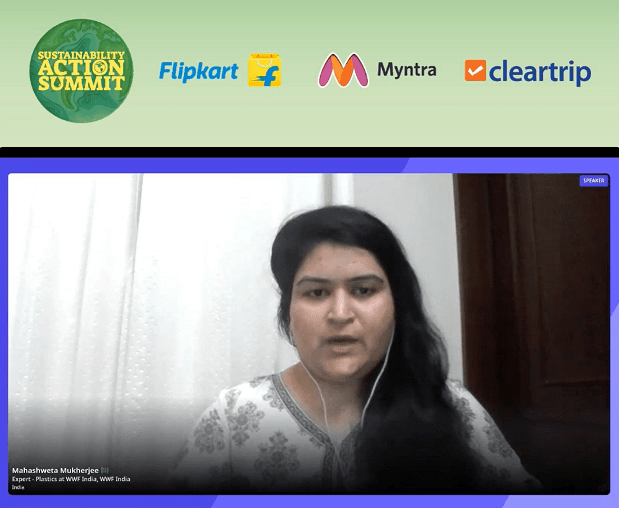
“Although the world is not using plastic efficiently which is causing landfills and pollution of the air, rivers, and seas, the fact is that plastics per se are not the problem, its mismanagement is,” said Mahashweta Mukherjee of WWF India at the Flipkart Sustainability Summit 2021 held in November.
“Currently 300 million tons of plastic waste is produced yearly, which is almost equivalent to the weight of the entire human population. The fact is, we simply can’t cope with the amount of plastic on our planet, not the amount that continues to be produced,” Mukherjee said. “However, the plastic itself is not the problem. Rather its mismanagement is, which is why companies, corporations, civil society, and non-governmental organizations globally are calling for developing strategies towards a circular economy for plastics. A system where plastic does not pollute the environment.”
Cutting the flow of plastic into nature
Mukherjee said that plastic does not belong in nature. As part of a global strategy, WWF envisions a future with no plastic in nature, intending to curtail the flow of plastic into the ecosystem by 2030. This aligns well with the vision of the India Plastics Pack, unveiled in September this year, she said, adding that WWF India is engaged on this issue on multiple fronts.
The first project is the Ghost Gear project in which it is working to address the issue of fishnets lost at sea to spread awareness on the impact of plastic on the marine and coastal environment.
Another project is Tide Turners which inspires youth to reflect upon their plastic footprint and discover ways to reduce their consumption and benefit the community. The Give Up project encourages individuals and organizations to cut usage of single-use plastic.
India Plastics Pact
The India Plastics Pact launched in September aims to promote a circular economy for plastics through a public-private collaboration that enables innovative ways to eliminate, reuse, or recycle plastic packaging across the value chain and collectively achieve the long-term targets, Mukherjee said.
The India Plastics Pact is a joint initiative between WWF India and the Confederation of Indian Industry (CII). The Pact aims at enabling businesses to transition towards a circular economy for plastics by 2030.
At the core of all Plastics Pacts lie four ambitious, time-bound targets for reducing, innovating, and re-imagining plastic packaging. The India Plastics Pact’s targets to be achieved by 2030 are – define a list of unnecessary or problematic plastic packaging and items and take measures to address them through redesign and innovation; 100% of plastic packaging to be reusable or recyclable; 50% of plastic packaging to be effectively recycled and 25% average recycled content across all plastic packaging.
The Pact will stimulate innovative new business models to reduce the total amount of plastic packaging. It will also help build a stronger recycling system, ensuring that plastic packaging can be effectively recycled and made into new products, and also as far as possible back into packaging with the support of all stakeholders.
All stakeholders need to play their part
Mukherjee said that the various stakeholders in the plastic waste value chain within the framework of plastic waste management have an integral role to play in creating this circular plastic economy. Members include businesses from across the plastic packaging value chain – that is, plastic producing, using, and processing companies.
According to Mukherjee, companies with extensive use of plastic packaging should commit to proactively identifying the problematic and unnecessary plastic packaging in their product portfolio. “They should eliminate and replace the problematic plastic through redesign and innovation replacement, and used plastic delivery models. The elimination and or replacement by alternatives would be sound from a systems perspective, accounting for impact on the entire plastic packaging and package ecosystem and avoiding unintended consequences. When it comes to innovation and design ideas, all plastic packaging and components are to be redesigned for reuse and recycling,” she said.







